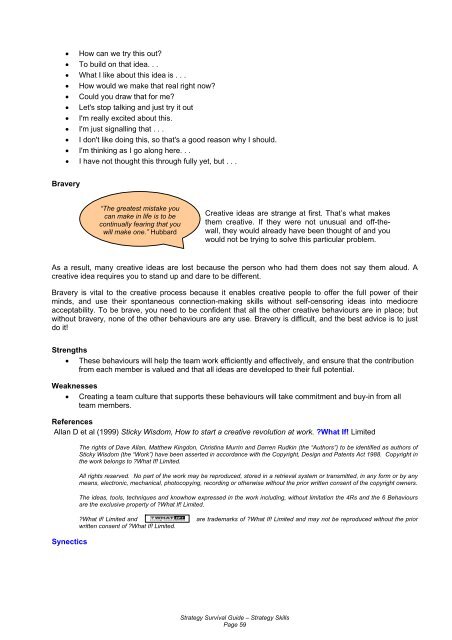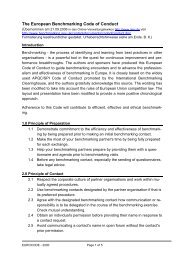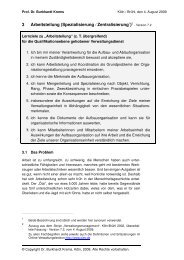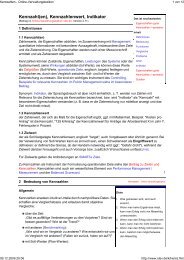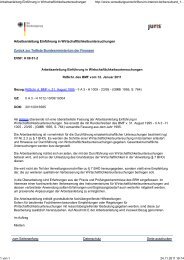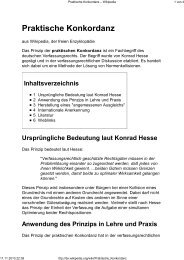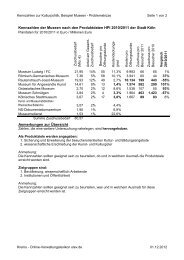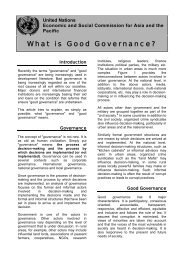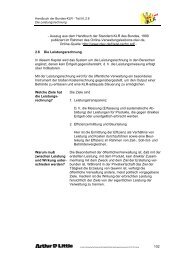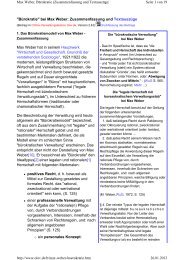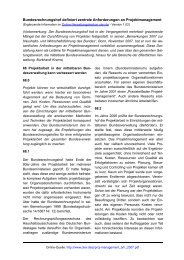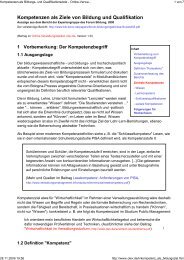Strategy Survival Guide
Strategy Survival Guide
Strategy Survival Guide
You also want an ePaper? Increase the reach of your titles
YUMPU automatically turns print PDFs into web optimized ePapers that Google loves.
• How can we try this out?<br />
• To build on that idea. . .<br />
• What I like about this idea is . . .<br />
• How would we make that real right now?<br />
• Could you draw that for me?<br />
• Let's stop talking and just try it out<br />
• I'm really excited about this.<br />
• I'm just signalling that . . .<br />
• I don't like doing this, so that's a good reason why I should.<br />
• I'm thinking as I go along here. . .<br />
• I have not thought this through fully yet, but . . .<br />
Bravery<br />
“The greatest mistake you<br />
can make in life is to be<br />
continually fearing that you<br />
will make one.” Hubbard<br />
Creative ideas are strange at first. That’s what makes<br />
them creative. If they were not unusual and off-thewall,<br />
they would already have been thought of and you<br />
would not be trying to solve this particular problem.<br />
As a result, many creative ideas are lost because the person who had them does not say them aloud. A<br />
creative idea requires you to stand up and dare to be different.<br />
Bravery is vital to the creative process because it enables creative people to offer the full power of their<br />
minds, and use their spontaneous connection-making skills without self-censoring ideas into mediocre<br />
acceptability. To be brave, you need to be confident that all the other creative behaviours are in place; but<br />
without bravery, none of the other behaviours are any use. Bravery is difficult, and the best advice is to just<br />
do it!<br />
Strengths<br />
• These behaviours will help the team work efficiently and effectively, and ensure that the contribution<br />
from each member is valued and that all ideas are developed to their full potential.<br />
Weaknesses<br />
• Creating a team culture that supports these behaviours will take commitment and buy-in from all<br />
team members.<br />
References<br />
Allan D et al (1999) Sticky Wisdom, How to start a creative revolution at work. ?What If! Limited<br />
The rights of Dave Allan, Matthew Kingdon, Christina Murrin and Darren Rudkin (the “Authors”) to be identified as authors of<br />
Sticky Wisdom (the “Work”) have been asserted in accordance with the Copyright, Design and Patents Act 1988. Copyright in<br />
the work belongs to ?What If! Limited.<br />
All rights reserved. No part of the work may be reproduced, stored in a retrieval system or transmitted, in any form or by any<br />
means, electronic, mechanical, photocopying, recording or otherwise without the prior written consent of the copyright owners.<br />
The ideas, tools, techniques and knowhow expressed in the work including, without limitation the 4Rs and the 6 Behaviours<br />
are the exclusive property of ?What If! Limited.<br />
?What if! Limited and<br />
written consent of ?What If! Limited.<br />
are trademarks of ?What If! Limited and may not be reproduced without the prior<br />
Synectics<br />
<strong>Strategy</strong> <strong>Survival</strong> <strong>Guide</strong> – <strong>Strategy</strong> Skills<br />
Page 59


